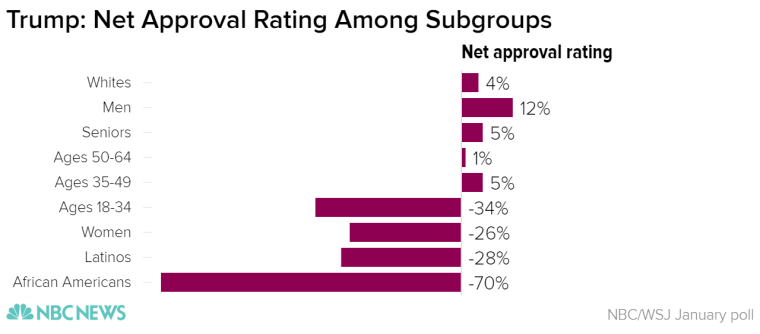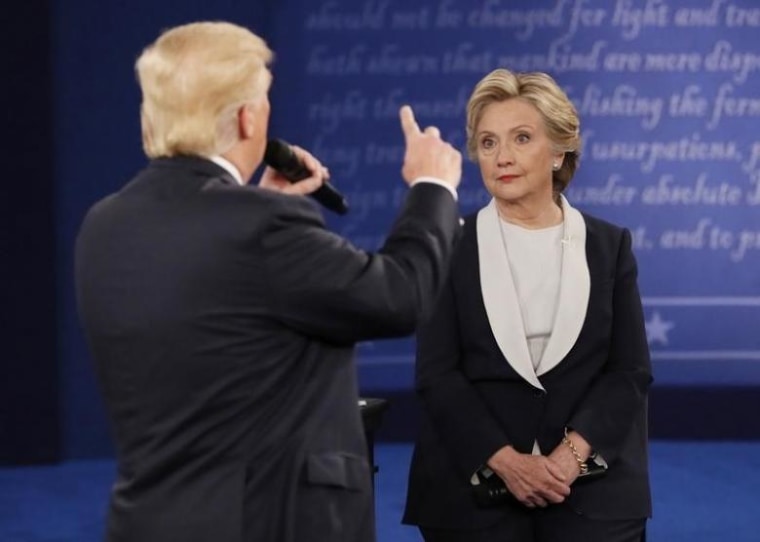First Read is a morning briefing from Meet the Press and the NBC Political Unit on the day's most important political stories and why they matter
Why Trump probably wishes Hillary Clinton were still around
We have three takeaways to the news from our latest NBC/WSJ poll, which shows President-elect Trump entering office Friday with historically low approval and favorability numbers. One, this is what happens when you don’t reach out to your opponents or the millions of Americans who didn’t vote for you. Two, Hillary Clinton lost the presidential election as much as Trump won it. (How do you lose to someone who is this unpopular, even during a honeymoon phase?) And three, Trump probably wishes Clinton were still around to campaign against. Here are the numbers:
- 44% approve of Trump’s transition handling (vs. 71% for Barack Obama in Jan. 2009 and 77% for Bill Clinton in Dec. 1992)
- Trump’s fav/unfav numbers stand at 38% positive, 48% negative (vs. Obama’s 67%-13% in Jan. 2009, Bush 43’s 50%-30% in 2001, and Bill Clinton’s 64%-16% in 1993).
- And just 30% have high confidence that Trump has the right set of goals and priorities (vs. Obama’s 54% in 2009, Bush 43’s 40% in 2001, and Bill Clinton’s 50% in 1993).

“Mr. Trump’s advisers said privately that his unexpected rise to power showed that such traditional [polling] barometers did not matter as much anymore. If polls were to be believed, he would not have been president, they said,” the New York Times’ Peter Baker writes. Then again, he was campaigning against an (almost) equally unpopular candidate in that election. In the coming months ahead, we’re about to find out what happens to a perpetual campaigner when he no longer has a singular opponent to campaign against.
The Obama coalition couldn’t beat Trump. But it’s dragging down his numbers
That’s another takeaway from our poll. Consider Trump’s approval numbers among key subgroups:
- Whites: 50% approve, 46% disapprove
- Men: 54% approve, 42% disapprove
- Seniors: 51% approve, 46% disapprove
- Ages 50-64: 48% approve, 47% disapprove
- Ages 35-49: 50% approve, 45% disapprove
Those aren’t bad numbers (at least if this wasn’t a honeymoon period for a president-elect). But then look at the numbers among Obama’s coalition:
- Ages 18-34: 31% approve, 65% disapprove
- Women: 35% approve, 61% disapprove
- Latinos: 32% approve, 60% disapprove
- African Americans: 13% approve, 83% disapprove

One other thing has happened with Trump’s approval rating: It declined from 50% in December to 44% now due in large part because independents went from 53%-32% to 44%-47%.
America to Trump: Enough with the tweets
And here’s the latest headline from our NBC/WSJ poll: 69% of Americans say that Trump tweeting isn’t a good thing. “Nearly seven-in-ten Americans say that Trump's use of Twitter is a bad idea, and only nine percent say they strongly support his use of the 140-character medium to announce policy positions and express his personal point of view,” one of us writes. And it’s a fairly unifying opinion: “Democrats overwhelmingly give Trump's tweets a thumbs down; 89 percent say his use of the medium is bad, while just 8 percent say it's good. But Republicans are divided, with 46 percent cheering on his 140-character messages while 47 percent call them a bad idea.” Think about it: In the past year, Trump has enjoyed two decent periods -- in the last 10 days of the election, and in the first couple of weeks after his presidential victory. And what do both have in common? They’re times when Trump was mostly putting down his phone.
Democrats left in the lurch
Here’s the big piece from NBC’s Alex Seitz-Wald: “When President-elect Donald Trump replaces Barack Obama on January 20, the Democratic Party will find itself more removed from power than at almost any point since the party’s creation. Scorned by the same voters who once embraced the New Deal, built the Great Society, and put their hope in the nation’s first black president, Democrats are now locked out of power in Washington and out of two-thirds of state legislative chambers across the country. Simply put, Democrats’ once vaunted coalition of the ascendant — younger, multiethnic, educated, and urban — failed them in 2016, and in 2014 and 2010 before that. That coalition proved to have major handicaps, part demographic and part geographic, that have been hollowing out the party for years.”
Yesterday’s DeVos hearing -- back to normal politics
Following yesterday’s Senate confirmation hearing for Trump Education pick Betsy DeVos, conservative New York Times columnist Ross Douthat observed, “All the DeVos controversies are so wonderfully, reassuringly normal. Like a tonic for the disturbed Trump-era political soul.” Indeed, per NBC News: “President-elect Donald Trump's nominee for education secretary told lawmakers at her confirmation hearing that guns might have a place in schools due to the threat from grizzly bears. Billionaire philanthropist Betsy DeVos faced tough questions during Tuesday's session, refused to rule out removing funding public schools if appointed and admitted her family may have made donations to the Republican Party totalling $200 million. Democrat Sen. Chris Murphy of Connecticut, who has been vocal on gun control in the wake of the Sandy Hook massacre, asked DeVos if she thought firearms had any place in or around schools. ‘I think that's best left to locales and states to decide,’ she replied. Pressed on whether she could say ‘definitively’ if guns shouldn't be in schools, she referred to an earlier remark by Sen. Mike Enzi (R-Wyo.) who mentioned an elementary school in Wapiti, Wyoming, that had erected a fence to protect children from wildlife. ‘I think probably there, I would imagine that there's probably a gun in the school to protect from potential grizzlies,’ DeVos said.”



